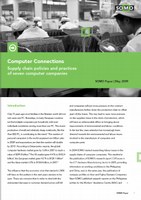
Meagre improvement labour issues computer industry
In 2004 SOMO started researching labour issues in the supply chains of computer companies. This resulted in different reports, company profiles, the launce of the makeITfair campaign and extensive consultation with the computer industry. Now SOMO is looking at how companies have improved their policies and practices.
As part of the research in the past years SOMO published company profiles on eight computer brands, detailing labour issues in their supply chain and policies dealing with the improvement of supply chain responsibility. SOMO has stayed in contact with these computer brands, asked the companies to review the research findings and company profiles, and asked companies to give feedback on how they followed up on the issues as reported by SOMO and other organisations. Seven of the eight companies replied to the questionnaire: HP, Apple, Sony, Acer, Toshiba, Dell and Fujitsu Siemens Computers. Their answers are the basis for the SOMO briefing paper ‘Computer Connections: Supply chain policies and practices of seven computer companies(opens in new window) ’. The 8th company, Packard Bell, has in the meantime been taken over by Acer and therefore did not answer the questionnaire.
The briefing paper discusses the supply chain responsibility and implemented codes of the companies. It looks at the influence of the companies beyond the first-tier suppliers, the implementation of the codes, the stakeholder involvement and the transparency and disclosure.
Most codes fall considerably short of what is viewed as the threshold standard for codes of conduct. Codes should therefore be adapted to include further standards. Five of the researched companies are member of the Electronic Industry Citizenship Coalition (EICC), a coalition of 45 companies in the ICT sector aligned around a common code of conduct. This EICC code, which is used as a base code by the five companies, should take a lead in the improvement of standards. Nonetheless, it is encouraging that in the last years several of the companies have adapted their codes to include further provisions on freedom of association and collective bargaining. Specific notice should be taken of the addition to the code on migrant workers by Apple.
There are many differences in implementation and there are quite a few companies who make very meagre to mediocre efforts to implement their code of conduct. Some of the companies only carry out reviews, while others rely on paltry industry efforts. The absence of civil society organisations in almost all the recorded efforts stands out. Only HP has worked with NGOs in China on implementation and workers trainings. Most of the companies are not auditing beyond the first tier or are expecting their first-tier suppliers to implement the code down the supply chain, sometimes without further training and mostly without any further auditing, and thus without influencing labour conditions further down the chain.
On the other hand there is a trend among several of the companies to work more intensively with the suppliers, through training of the management and through suppliers forums. Companies report that they are training their suppliers to commence auditing of their suppliers and to carry the responsibility.
It is difficult to assess the efforts taken by companies to improve the situations in the researched factories. Only HP has been transparent in sharing their efforts in this respect with SOMO. None of the other companies has provided information and several are ignoring questions on this issue or referring to confidentiality agreements.
Related news
-
 The hidden human costs linked to global supply chains in ChinaPosted in category:News
The hidden human costs linked to global supply chains in ChinaPosted in category:News Joshua RosenzweigPublished on:
Joshua RosenzweigPublished on: -
 Major brands sourcing from China lack public policies on responsible exitPosted in category:News
Major brands sourcing from China lack public policies on responsible exitPosted in category:News Joshua RosenzweigPublished on:
Joshua RosenzweigPublished on: -


